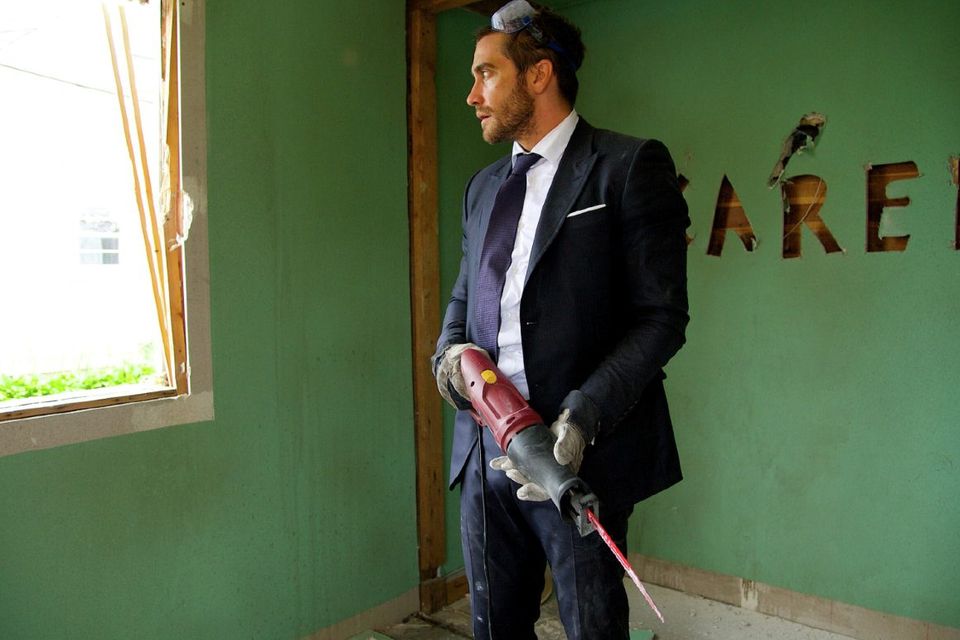Now showing: Demolition Cert: 15A
Rating: 2/5
Jake Gyllenhaal plays a troubled widower in Jean-Marc Vallee’s ‘Demolition’killed
Sledgehammers are omnipresent in Jean-Marc Vallee's latest tale of self-help redemption by way of a trite metaphor. In 2014's Wild, the Canadian director shot Reese Witherspoon as a wayward woman finding herself out in 'the wild'. No prizes then for guessing what gets Jake Gyllenhaal's character back on his feet after his wife's death in Demolition.
But while some of these sledgehammers are tangible, most are figurative ones wielded by Vallee to push the film's "rip it up and start again" symbolism. The point is laboured, to say the least.
Davis (Gyllenhaal) is a dead-on-the-inside Manhattan executive whose young wife dies in a tragic road accident. He seems unable to mourn, which doesn't help his already problematic relationship with father-in-law and boss Phil (Chris Cooper). He writes all this (and anything else his troubled mind excretes) in letters to a troubled customer-service worker called Karen (Naomi Watts). Soon, he has moved in with her and is bonding with her troubled teenage son, Chris (Judah Lewis).
You may have noticed that many of Demolition's white middle-class suburbanites are "troubled". Davis and Karen in particular subsist on the kind of navel-gazing, free-associating waffle that New Yorkers love to relay to overpaid therapists. Put simply, hardly a single line sounds like anything uttered by real people in real life, and this makes them difficult to fully relate to.
Of course, this isn't real life. This is that America where people in million-dollar glass boxes without financial cares are entitled to totally extricate themselves from society if the happiness boat is rocked. Vallee's 2013 Oscar-winner Dallas Buyers Club hit a note because redemption came at a cost in that film. Here, it's couriered straight to the door along with some pretty cinematography.
Atlantic Cert: Club. Now showing at the IFI
Rating: 5/5
Review by Aine O'Connor
Risteard O'Domhnaill does things so the rest of us don't have to. Or that is sometimes what it feels like as he lays out the effects of capitalism and corruption in a world in which many of us are too daft, scared or worn out to notice. His previous award-winning documentary The Pipe examined the Shell to Sea campaign and his latest documentary makes similarly vital, if somewhat depressing, viewing.
Atlantic focuses on three fishing communities - in Ireland, Norway and Newfoundland - each affected by different large interests. When Ireland joined the then EEC in 1973 we handed over control of fish stocks, and each year the member countries are allocated a fishing quota.
This means that small Irish fishing operations look on as supertrawlers from other jurisdictions swallow vast quantities of fish from the Irish sea, killing off the indigenous industry and wreaking havoc on North Atlantic fish stocks.
It was sweeping measures to counteract a threat to cod stocks that put the fishermen of Newfoundland out of business in the 1990s. They then reinvented themselves for the oil business, but now that is under threat too. In turn, it is oil exploration that threatens the closely protected Arctic fishing industry in Norway. The documentary reveals a cycle of short-sighted measures based on short-term gain that wreak long-term destruction both on the small communities immediately affected and the entire eco-system of the North Atlantic.
Well researched and put together, this is important stuff, not least because there is still time.
Captain America: Civil War Cert: 12A
Rating: 4/5
Review by Aine O'Connor
I confess that the prospect of yet more super heroes duelling it out did not fill me with joy - I have a limited capacity for super folk and this year's supply is all but used up. However, this serving of conflicted mega peeps, almost all of the Marvel characters now familiar on the big screen, proved an enjoyable, if overly long, episode in a series that still has a long way to run.
Following the destruction wrought in Avengers: Age of Ultron, the UN and the US Secretary of Summat (William Hurt) want the Avengers to either submit to official control or cease and desist all world-saving ops.
The issue for the authorities is whether they are heroes or vigilantes, but the issue for Avengers is the quality of the power they will be subject to.
Fuelled by guilt and the need to get back in with his girlfriend, Iron Man (Robert Downey Jr) leads a cohort, including War Machine (Don Cheadle) and Black Widow (Scarlett Johansson, pictured below), who are keen to agree to regulation. On the other hand, Captain America (Chris Evans), aware that their first task will be to kill the Winter Soldier (Sebastian Stan) - his childhood friend turned ruthless killer - is more conflicted. With him are Hawkeye (Jeremy Renner) and Falcon (Anthony Mackie). The remaining heroes, and a few extra recruits, pick sides and civil war ensues.
Directors Anthony and Joe Russo, working from a screenplay by Christopher Marcus and Stephen McFeely, keep a firm hold of what, with so many characters and so many stars, could have gone badly wrong. They deliver a strong story about friendship and principle that hits the right notes without getting po-faced and has a very different tone to Batman V. Superman, the film that it will inevitably be compared to.
There's a light touch, and it is often funny. There are many series in-jokes - the scene where Iron Man recruits Spider-Man (Tom Holland) is a classic example. And the action scenes are outstanding.
Son of Saul Cert: 15A
Rating: 5/5
Review by Aine O'Connor
It is a further measure of the utter insanity of the Nazi regime that when it became obvious that it was losing the war, rather than focus on military efforts it stepped up the extermination rates in the concentration camps. This put pressure on one aspect of the death camps rarely focused upon, the actual system of mass murder.
The system required that some inmates, known as Sonderkommando, be chosen to process the ones who were to be killed. These Sonderkommando were kept alive long enough - but not too long - to be able to do all of the work involved in murdering thousands of people each week.
In this extraordinary film, Hungarian director Laszlo Nemes, working from a script he co-wrote with Clara Royer, tells a story set over two days in Auschwitz from the point of view of Hungarian Sonderkommando Saul Auslander (Geza Röhrig). The entire film is shot via close-up of Saul, who, at the beginning of the story, sets himself a mission to find a rabbi. This mission overrides almost all other concerns, including at times the escape plans of his co-Sonderkommando. The camera angle is wearing in places but effective in that it expresses the focus the men must have needed in order to do the work demanded of them.
They each had a task handling the "pieces", as the SS referred to the bodies, and in the background, out of focus but still present, tasks such as extracting gold teeth from the corpses continued. But life of sorts always goes on, the valuables stolen from the murdered were not always handed over and became currency for other inmates, for food, sex or favours. But Saul's mission to find a rabbi is his personal fight against dehumanisation.
It's a rarely expressed side of an oft-told story that proves simple, harrowing and effective.
Join the Irish Independent WhatsApp channel
Stay up to date with all the latest news















